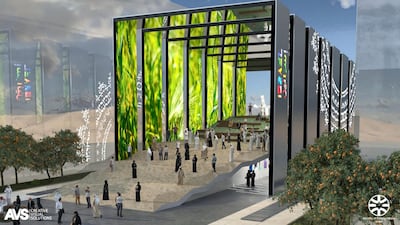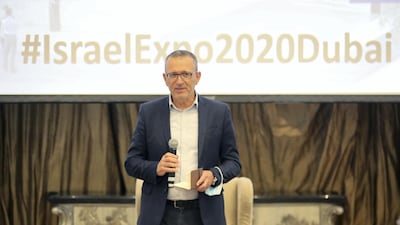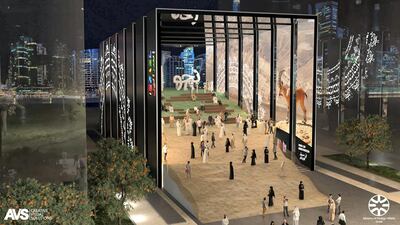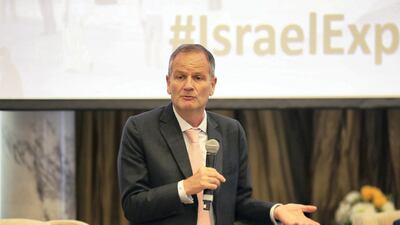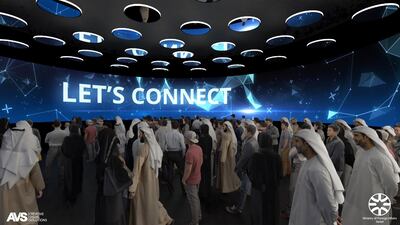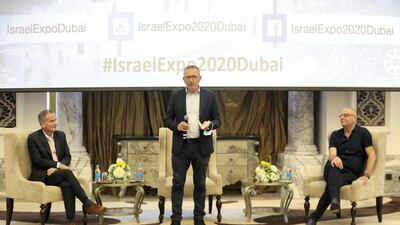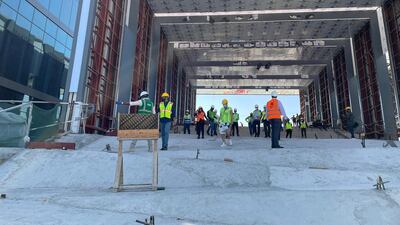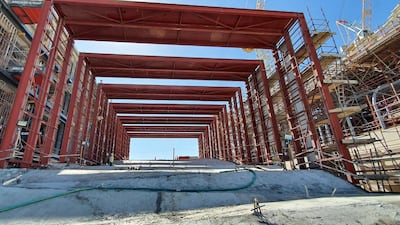Israel will convey messages of openness and co-operation with its Expo 2020 Dubai pavilion.
Inspired by an open tent concept, Israel’s pavilion will be open from end to end and feature seven gates that visitors can walk through as they climb a slope that forms the roof of the main arena below.
The internal sides of the gates will have LED screens where information about Israel and its culture will be projected.
Underneath, the main arena will tell the story of Israel’s history, heritage, culture and its people.
"We are going to take the visitors on a voyage of Israel, showing them the diversity of the people and the various ethnic groups in Israel," Elazar Cohen, Israel's Expo 2020 Dubai commissioner general, told The National.
The pavilion's theme, Journey to Tomorrow – displayed on its logo on the building in a combination of Hebrew and Arabic languages – will form the basis of its plan for the six months, where the intent is to forge relationships and create new economic opportunities.
“It’s the only pavilion that you can see through to the horizon,” Mr Cohen said.
“You can see the horizon. You can see the future. It's an invitation for everyone to join us to join together towards a future, a good future that the region has thanks to the Abraham Accord.”
Mr Cohen said Israel received the invitation in April 2019, more than a year before the signing of the Abraham Accord on September 15, 2020.
“It is not a simple decision to invite Israel to attend in an Arab country for six months in one of the biggest events in the world and for that we are grateful to the government of the UAE and to the organisers,” Mr Cohen said.
He described the Abraham Accord as an “historic agreement" that will be hugely beneficial.
“Not only on the bilateral level of UAE, I think they have an immensely positive influence in the region and even beyond," Mr Cohen said.
“These agreements created many frameworks for the region. We would like to use Expo 2020 as a platform to pour content into these agreements, in the economy, investments, culture, and academy [universities]."
Since the Abraham Accord, bilateral trade has soared, reaching Dh1 billion ($272.3m) by January this year. Mr Cohen sees Expo as an opportunity to grow that further.
"Israel is known as an innovative country. I think that we can join our strong elements with whatever the UAE has to offer, and the UAE has a lot to offer," he said.
“Expo is only a small phase and an important platform, but I'm sure that there will be a lot of co-operation events before during and after the Expo period.”
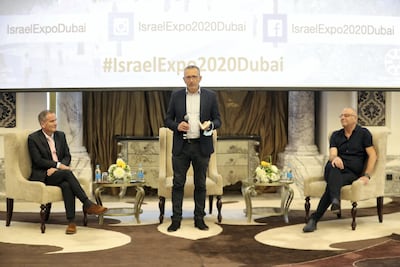
Mr Cohen said the design of the pavilion is based on the tent of Abraham, which was open to all four sides. The intention is to convey Israel's key messages, the first of which is openness.
“We wanted to transmit that we are an open country, we are part of the region and we are embracing everyone,” Mr Cohen said.
The second message is that Israel is an integral part of the region with a desire to “deepen and widen our presence here”, he said.
The final message is to collaborate and co-operate and help to “create synergies for people in the region”.
The pavilion focus will be on Israel's expertise across a variety of industries and to connect with other nations taking part.
“We are going to show in our pavilion all kinds of possibilities of opportunity co-operation in many sectors – in food security, in water, in the protection of the environment, in cyber, in smart mobility and smart energy – all the challenges that humanity is facing today.
“We would like to join our knowledge with the knowledge that exists here and the entire world.
“I think that we can together unite and invest in a common future and learn that what unites us is much bigger than what divides us. This is one of the messages we want to pass to our visitors.”
With six flights a day now operating to Dubai and Abu Dhabi, he expects Expo to encourage more visitors to come from Israel for the event.
“There is a great interest in Israel to visit the UAE, both Abu Dhabi and in Dubai. It's a new destination. It's an Arab country, many of the Israelis have Arab origins and they don't have many Arab destinations to visit and now the UAE is open to them, and they are very much eager to come and visit.”
Last month, fighting between Israel and Hamas escalated to its worst level since 2014. The 11-day conflict killed scores of people, caused widespread destruction in the Gaza Strip and brought life in much of Israel to a standstill.
Mr Cohen said the conflict did not have any impact on its plans for Expo.
“Life is composed of many verticals. Some of them are not that positive, some of them are very positive. Expo is concentrating on the positive agenda and we are going to focus also on the positive agenda.
“We're not going to single ourselves out. So, the events are events, but we are focusing on Expo and the positive results of Expo.”
